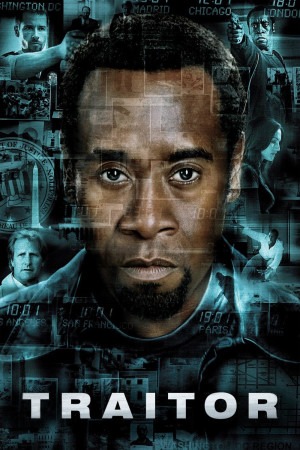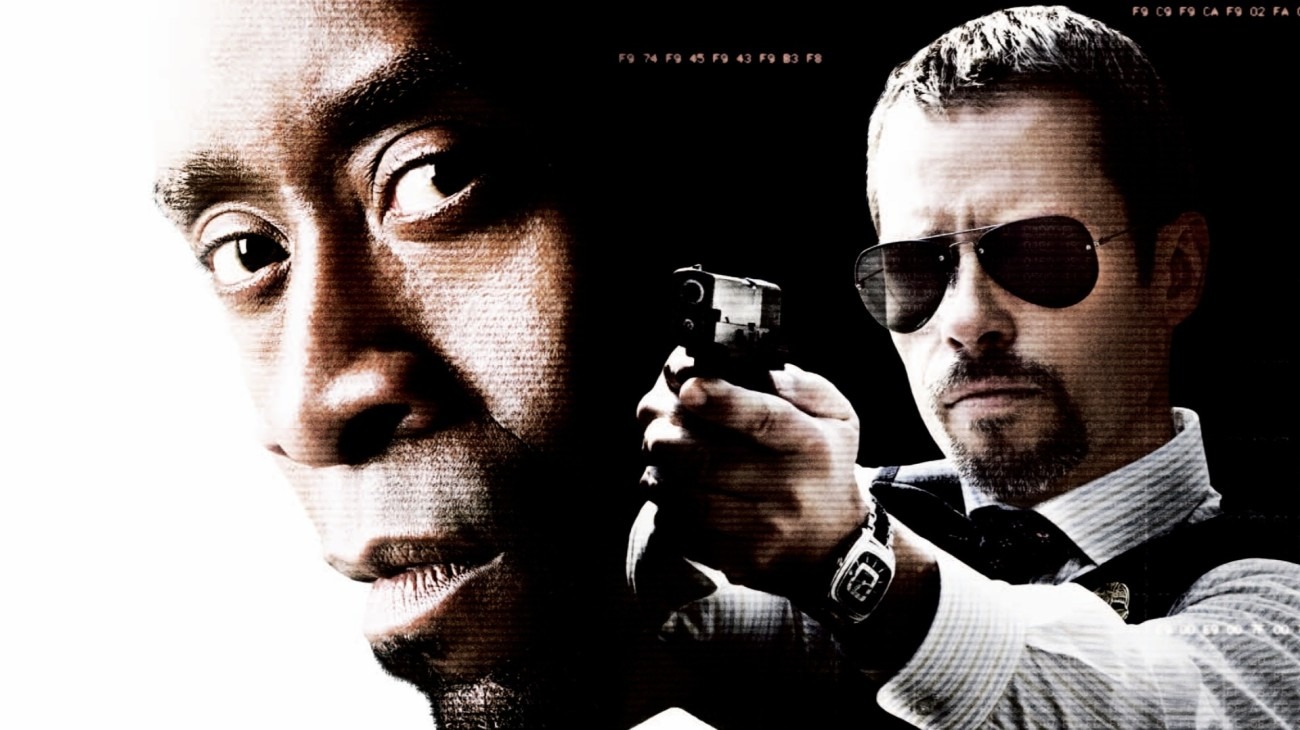
Cops and terrorists
Intentions be damned, Traitor is an appallingly cynical film. Though born from what I'm sure was a very sincere wish to show how Muslims are as diverse and conflicted as any other group of people, and that Islam is nor more all good or all bad than any other religion, the film's story runs screaming into the filmmakers' desire to be all things for all audiences, to justify the liberal humanist belief that we should never demonise anyone based on identity while catering to neo-conservative xenophobia and bloodlust; in short, to appeal to the biggest possible audience while offending nobody. Which means, inevitably, that it has something to offend everybody.
The traitor of the story (concoted by none other than comic actor Steve Martin on the set of Bringing Down the House, believe it or not) is Samir Horn, played by the ever-reliable Don Cheadle, who doubles as one of the film's producers. We meet Samir in Yemen, as he makes ready to sell detonators to an Islamic terrorist group named El Nathir, represented by mid-level functionary Omar (Said Taghmaoui). The deal is interrupted by way-out-of-their-jurisdiction FBI agents Clayton (Guy Pearce, looking uncannily like Ed Burns, I thought) and Archer (Neal McDonough), who take an instant disliking to Samir and begin to concoct a plan by which he will be their key to all terrorists. For about an hour, the film rotates from scenes of Samir globetrotting around and helping to plant bombs, to scenes of the Feds interviewing basically everybody who ever knew Samir back when he was naught but a happy U.S. Army Special Operations officer from Chicago. Why yes, he's an American! Who became a terrorist! That makes him a traitor!
Except, ho ho, we find out about halfway through that Samir is actually working with a CIA operative, Carter (Jeff Daniels), who has some contact with Clayton and Archer and the FBI, but thanks to the internecine dick-measuring of the U.S. intelligence community, Carter has devoted all of his energies to making sure his man on the inside is known to him and him alone. Seems that Carter's been using Samir to get as close as possible to the mysterious Nathir (Raad Rawi), head of El Nathir, faking deaths left and right to crack a long-gestating plot to attack a yet-undetermined target deep within the United States. Why, he's a Muslim! Who fights against global jihad! That makes him a traitor!
If I really, really had to, I could probably get over the way the movie panders about Muslims: most of them are brutal killers, but hey, not this fella, who's just about as docile and accommodating as anybody ever could be - sort of a Magic Muslim and Magic Negro blended into one squicky package. Yeah, I could probably choke that down. It helps immeasurably that the film snagged Cheadle, who has enough quiet dignity just when he stands and smolders to make the character seem much fuller than he ever could have on the page.
But the script itself, that is an abomination beyond even the most generous indulgence. It plays very much like a series of high school debating points read off by characters instead of speech team members, particularly in the first half, and especially in the clunky lines given to Pearce (usually a very fine actor) and McDonough (a good enough character actor when he has a decent role), lines that neither performer can turn into anything other than op-ed soundbites. Doubtlessly, writer-director Jeffrey Nachmanoff (whose last credit was co-writing The Day After Tomorrow) was pleased by all of the nifty little facts that he was thus able to smuggle to the audience - "Didja know that most Muslims aren't even Arab? And that Islam is a religion of peace and submission to God? Hey, 'Islam' even means submission! Also, they have a lot of legitimate complaints about American policy, but there's no excuse for expressing those complaints through violence." - but there's nothing remotely dramatic about it, and he's not a good enough director to make scenes of pe that ople talking seem interesting. It happens that Cheadle was also one of the many producers of Crash, and though it's a certainty that the earlier film could hardly be a primary influence on Traitor, I can't resist the temptation to use that connection as a jumping-off point, and compare this film's ham-fisted exposition and featherweight political theorising with that earlier film, and its own hammer-to-the-skull cultural morality.
Thank God, then, that Nachmanoff is at least enough of a director that he can wrangle Traitor into something like a decent suspense thriller in the second hour, once the question of Samir's culpability has been resolved and we can settle in and enjoy the cat-and-mouse mechanics: will he complete his task before Clayton catches up with him? Will the Ee-vil Muslims discover that he's a double-agent? It's not Hitchcock, but for one of the last films of the summer's dumping period, it's fairly diverting, if you can ignore the occasional political yuckiness that becomes a lot less important right around this point. Add in the generally fleet editing by Billy Fox (fast, but not too fast) and the appealingly gritty, just-shy-of-clichéd cinematography by J. Michael Muro (who also shot Crash, and was perhaps the only objectively great thing about that film), and Traitor even comes close to being a pretty satisfying work of craftsmanship. No, it's not what anybody involved was hoping for, but any port in a storm, right?
On a more private note, I'd like to salute the film's successful evocation of Chicago; as the third film of the summer, after Wanted and The Dark Knight, to use the city as a backdrop for various action shenanigans, it's the first one that honestly seems to capture something of the textur' and reality of the place,* outside the odd random goof like setting a scene at 128 S Randolph (it's an east-west street), and trying to portray that location as the projects (128 W Randolph is across the street from City Hall, and 128 S Anything is probably an office building). Ah, to live in a city even as it becomes a haven to action pictures!
4/10
The traitor of the story (concoted by none other than comic actor Steve Martin on the set of Bringing Down the House, believe it or not) is Samir Horn, played by the ever-reliable Don Cheadle, who doubles as one of the film's producers. We meet Samir in Yemen, as he makes ready to sell detonators to an Islamic terrorist group named El Nathir, represented by mid-level functionary Omar (Said Taghmaoui). The deal is interrupted by way-out-of-their-jurisdiction FBI agents Clayton (Guy Pearce, looking uncannily like Ed Burns, I thought) and Archer (Neal McDonough), who take an instant disliking to Samir and begin to concoct a plan by which he will be their key to all terrorists. For about an hour, the film rotates from scenes of Samir globetrotting around and helping to plant bombs, to scenes of the Feds interviewing basically everybody who ever knew Samir back when he was naught but a happy U.S. Army Special Operations officer from Chicago. Why yes, he's an American! Who became a terrorist! That makes him a traitor!
Except, ho ho, we find out about halfway through that Samir is actually working with a CIA operative, Carter (Jeff Daniels), who has some contact with Clayton and Archer and the FBI, but thanks to the internecine dick-measuring of the U.S. intelligence community, Carter has devoted all of his energies to making sure his man on the inside is known to him and him alone. Seems that Carter's been using Samir to get as close as possible to the mysterious Nathir (Raad Rawi), head of El Nathir, faking deaths left and right to crack a long-gestating plot to attack a yet-undetermined target deep within the United States. Why, he's a Muslim! Who fights against global jihad! That makes him a traitor!
If I really, really had to, I could probably get over the way the movie panders about Muslims: most of them are brutal killers, but hey, not this fella, who's just about as docile and accommodating as anybody ever could be - sort of a Magic Muslim and Magic Negro blended into one squicky package. Yeah, I could probably choke that down. It helps immeasurably that the film snagged Cheadle, who has enough quiet dignity just when he stands and smolders to make the character seem much fuller than he ever could have on the page.
But the script itself, that is an abomination beyond even the most generous indulgence. It plays very much like a series of high school debating points read off by characters instead of speech team members, particularly in the first half, and especially in the clunky lines given to Pearce (usually a very fine actor) and McDonough (a good enough character actor when he has a decent role), lines that neither performer can turn into anything other than op-ed soundbites. Doubtlessly, writer-director Jeffrey Nachmanoff (whose last credit was co-writing The Day After Tomorrow) was pleased by all of the nifty little facts that he was thus able to smuggle to the audience - "Didja know that most Muslims aren't even Arab? And that Islam is a religion of peace and submission to God? Hey, 'Islam' even means submission! Also, they have a lot of legitimate complaints about American policy, but there's no excuse for expressing those complaints through violence." - but there's nothing remotely dramatic about it, and he's not a good enough director to make scenes of pe that ople talking seem interesting. It happens that Cheadle was also one of the many producers of Crash, and though it's a certainty that the earlier film could hardly be a primary influence on Traitor, I can't resist the temptation to use that connection as a jumping-off point, and compare this film's ham-fisted exposition and featherweight political theorising with that earlier film, and its own hammer-to-the-skull cultural morality.
Thank God, then, that Nachmanoff is at least enough of a director that he can wrangle Traitor into something like a decent suspense thriller in the second hour, once the question of Samir's culpability has been resolved and we can settle in and enjoy the cat-and-mouse mechanics: will he complete his task before Clayton catches up with him? Will the Ee-vil Muslims discover that he's a double-agent? It's not Hitchcock, but for one of the last films of the summer's dumping period, it's fairly diverting, if you can ignore the occasional political yuckiness that becomes a lot less important right around this point. Add in the generally fleet editing by Billy Fox (fast, but not too fast) and the appealingly gritty, just-shy-of-clichéd cinematography by J. Michael Muro (who also shot Crash, and was perhaps the only objectively great thing about that film), and Traitor even comes close to being a pretty satisfying work of craftsmanship. No, it's not what anybody involved was hoping for, but any port in a storm, right?
On a more private note, I'd like to salute the film's successful evocation of Chicago; as the third film of the summer, after Wanted and The Dark Knight, to use the city as a backdrop for various action shenanigans, it's the first one that honestly seems to capture something of the textur' and reality of the place,* outside the odd random goof like setting a scene at 128 S Randolph (it's an east-west street), and trying to portray that location as the projects (128 W Randolph is across the street from City Hall, and 128 S Anything is probably an office building). Ah, to live in a city even as it becomes a haven to action pictures!
4/10
Categories: political movies, thrillers






